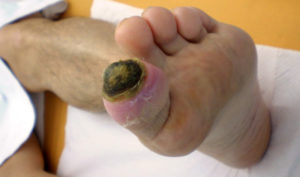The Cuban company Heber Biotec and the American company Mercurio Biotec have agreed to join efforts to bring Heberprot-P therapy to patients with diabetic foot ulcer (UPD) in the United States, once approved by the Drug and Food Administration of that nation (the FDA, for its acronym in English).
Diabetic foot ulcer is a major diabetic complication. It has been shown that diabetic patients have decreased growth factor concentrations in their tissues, particularly epidermal growth factor. The scarcity of the growth factor affects the healing of the wound, which leads to chronic wounds that do not heal and, sometimes, to the final amputation. The ischemic ulcer of the diabetic foot is the most difficult to treat and confers the greatest risk of amputation. Deeply injecting the epidermal growth factor into the bottom of the wound and contours fosters a more effective pharmacodynamic response in terms of granulation tissue growth and wound closure and reduces amputations related to diabetes, according to their laboratories.
Due to the success story of the product and the commitment established between Mercury and Heber, it is hoped that Cuban therapy can reduce the relative risk of amputation by UPD in the United States, in more than half of the current figures, as reported in press release the business group BioCubaFarma.
Nearly one million American patients debut with UPD annually. This complication increases the risk of amputations of the lower extremities. In five years, the number of amputees in the North American country has increased from 73 thousand to 85 thousand, with negative consequences for families and health systems, social and economic effects.
EMPRESAS DE EEUU Y CUBA ACUERDAN UNIR ESFUERZOS PARA LLEVAR NUEVA TERAPIA A DIABETICOS
La compañía cubana Heber Biotec y la estadounidense Mercurio Biotec acordaron unir esfuerzos para llevar la terapia del Heberprot-P a pacientes con úlcera del pie diabético (UPD) en Estados Unidos, una vez aprobado por la Administración de Drogas y Alimentos de esa nación (la FDA, por sus siglas en inglés).
La úlcera del pie diabético es una complicación diabética principal. Se ha demostrado que los pacientes diabéticos tienen concentraciones de factor de crecimiento disminuidas en sus tejidos, particularmente el factor de crecimiento epidérmico. La escasez del factor de crecimiento afecta la cicatrización de la herida, lo que conduce a heridas crónicas que no cicatrizan y, a veces, a la amputación final. La úlcera isquémica del pie diabético es la más difícil de tratar y confiere el mayor riesgo de amputación.
Inyectar profundamente el factor de crecimiento epidérmico en el fondo de la herida y los contornos fomenta una respuesta farmacodinámica más efectiva en términos de crecimiento del tejido de granulación y cierre de la herida y reduce las amputaciones relacionadas con la diabetes, según sus laboratorios.
Por la historia de éxito del producto y el compromiso establecido entre Mercurio y Heber, es de esperar que la terapia cubana pueda reducir el riesgo relativo de la amputación por UPD en Estados Unidos, en más de la mitad de las cifras actuales, según informó en nota de prensa el grupo empresarial BioCubaFarma.
Cerca de un millón de pacientes estadounidenses debutan con UPD anualmente. Esta complicación aumenta el riesgo de amputaciones de las extremidades inferiores. En cinco años, la cantidad de amputados en el país norteamericano ha aumentado de 73 mil a 85 mil, con negativas consecuencias para las familias y los sistemas de salud, afectaciones sociales y económicas.
Agencies/PubLMed/CubaDeb/Internet Photos/Arnoldo Varona/ TheCubanHistory.com
THE CUBAN HISTORY, HOLLYWOOD.









